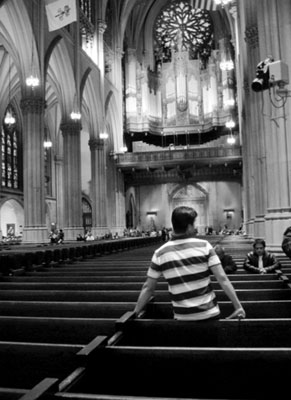All Nonfiction
- Bullying
- Books
- Academic
- Author Interviews
- Celebrity interviews
- College Articles
- College Essays
- Educator of the Year
- Heroes
- Interviews
- Memoir
- Personal Experience
- Sports
- Travel & Culture
All Opinions
- Bullying
- Current Events / Politics
- Discrimination
- Drugs / Alcohol / Smoking
- Entertainment / Celebrities
- Environment
- Love / Relationships
- Movies / Music / TV
- Pop Culture / Trends
- School / College
- Social Issues / Civics
- Spirituality / Religion
- Sports / Hobbies
All Hot Topics
- Bullying
- Community Service
- Environment
- Health
- Letters to the Editor
- Pride & Prejudice
- What Matters
- Back
Summer Guide
- Program Links
- Program Reviews
- Back
College Guide
- College Links
- College Reviews
- College Essays
- College Articles
- Back
Prejudice at Church
Most people could safely assume that there is no discrimination in church. They are wrong. When I was about ten years old, I had one of the most eye-opening experiences of my life. Expecting nothing unusual, my dad and I prepared for Sunday mass. When we arrived to the church, we saw a man standing in an aisle, completely alone. We first noticed the kind of robe he wore. Under the glaring church lights, the magnificent cloth shone like the sun. Lively greens, shadowy purples, and fiery reds carpeted each thread. Strange and unique symbols coated his entire body. Like a shade of red in a sea of grey, he brought an abundance of attention to himself. In a matter of seconds, we realized that he was wearing a traditional foreign outfit. Confused, I turned to my dad and asked, “What is wrong with these people?”
“They don’t know how to react to different cultures,” he answered.
For me, the saddest part was that the man in the robe stayed for the whole mass, despite the fact that no one made any kind of effort to sit close to him. The rows in front of and behind him had absolutely no one occupying them. I wondered if anyone else realized the prejudice of the situation at hand. ‘He doesn’t deserve this,’ I thought to myself. He had done nothing wrong, and the fact that he faced such exclusion made me both embarrassed and sad.
I considered asking my dad if we could make the effort to fill in some of the emptiness that surrounded him. I hoped more people wanted to do something but just didn’t have the courage. If I had been braver, I would have gladly shown support for him. Recalling the situation evokes feelings of anger because I can specifically remember the image of the man in his robes secluded from the rest of the churchgoers. He stood there completely abandoned, like trash that no one wanted to have anything to do with.
Although I cannot change what happened on that day, I feel that the situation taught me to not live in fear of doing what is right. Maybe other people wanted to do something, but no one ever took the first step. Had I not been so worried about other’s opinions, I may have assembled a group of people who sympathized with the man. The situation itself impacted me greatly, and I still live with the regret of overlooking an opportunity to make a change for the better.
I still harbor feelings of guilt, but I vowed to take action if I ever witness something similar in the future. Now that I am older, smarter, and more experienced, I feel like I am capable of putting my insecurities aside and showing empathy for people who face discrimination. In the places where one would least expect it, prejudice may be found. Church used to represent a safe place where people come together and disregard their differences to express a mutual love for God. I had one of the biggest shocks of my life when I realized that even at places that I felt comfortable in, people still put others below them, either because of their own ignorance or because of a strange gratification achieved by making others feel inferior.
In my imagination, I sometimes relive the situation but with a different outcome. Instead of only having the desire to help, I fearlessly take action. I stand up, turn a blind eye to criticism, and take a seat next to the man. I respectfully remain silent during the congregation, but I greet him and give a friendly smile. Once the mass ends, I make conversation. “Where are you from?” I ask in a neighborly manner. These small but thoughtful actions might have given a trace of hope to the man. Even if only one person is willing to put forth this kind of effort, it makes a difference. I can only wish that I had reacted differently, but for others, opportunities exist around every corner. People should take every chance to get out there and improve someone else’s day. If one witnesses someone who is excluded and lonely, he or she should extend a hand. Even one friend just might make all the difference in the world to those who are outcasts.

Similar Articles
JOIN THE DISCUSSION
This article has 0 comments.
